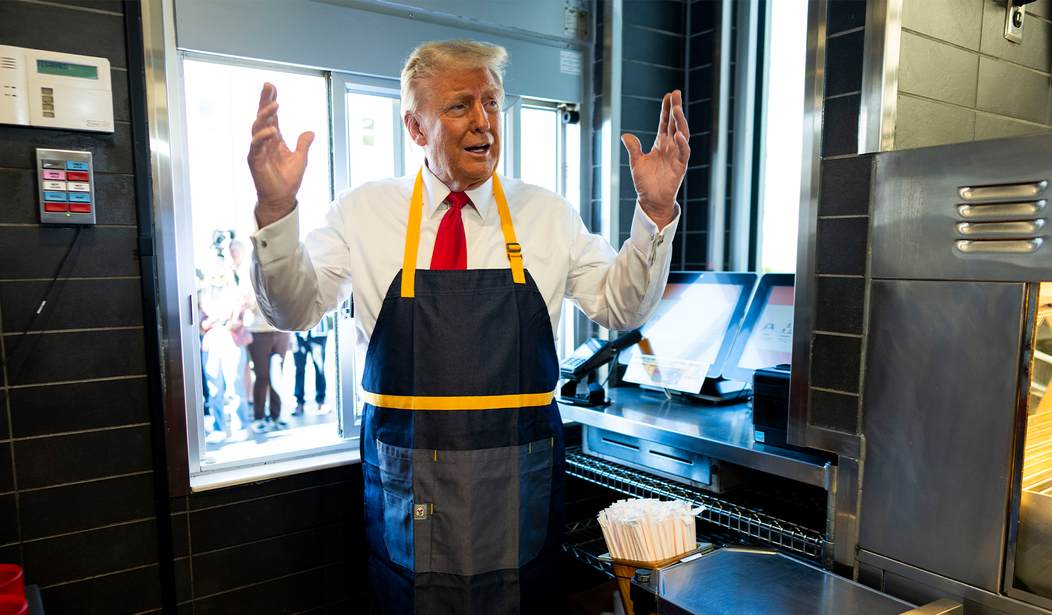If Joe Biden and Kamala Harris had their way, the McDonald’s franchise where Donald Trump served up fries on Sunday might not exist.
This isn’t just because the location hosted a campaign appearance for Mr. Trump. The Biden-Harris administration has embarked on a years-long effort to overtax and overregulate small businesses that follow the franchise model.
Last year, the Biden-Harris administration finalized a rulemaking through the National Labor Relations Board (NLRB) that would radically rewrite the joint employer standard, which governs how two companies may be held jointly responsible for the same set of employees. The Biden-Harris standard greatly expanded the traditional understanding of a joint employer relationship, increasing legal liability for businesses engaged in franchising and supercharging the ability for Big Labor to unionize workers across franchises.
One study indicated that an expanded joint employer standard like the one promoted by Joe Biden and Kamala Harris would have caused tens of billions of dollars in economic damage and hundreds of thousands of job losses in the franchising sector alone. Had their rule not been struck down by the courts earlier this year, franchise restaurants nationwide would be at risk of shutting down.
The McDonald’s location at which President Trump worked a shift over the weekend was one of these franchise restaurants. Local Pennsylvania franchisee Derek Giacomantonio opened his restaurant’s doors to the former President, who praised the Bucks County, Pennsylvania, location as “a great franchise.”
The Trump administration had propagated its own joint employer standard in 2020, which restored decades-long precedent that a business can only be held as a joint employer if it holds “substantial direct and immediate control” over the employees of another business. This model allowed franchises to thrive, allowing thousands of Americans to become first-time small business owners like Mr. Giacomantonio.
Recommended
Although courts ultimately rejected the Biden-Harris rule and reinstated the Trump rule, franchises are at risk yet again. Kamala Harris and her running mate Tim Walz have repeatedly endorsed the PRO Act, a grab-bag of progressive labor policies featuring everything from the elimination of state right-to-work laws to the forcible reclassification of independent contractors as employees. The PRO Act would also codify the Biden-Harris administration’s expansive joint employer standard into federal statute, pushing small business owners and their employees into instability once again.
One cosponsor of the PRO Act is Pennsylvania Senator Bob Casey (D), who on Monday retaliated against Trump’s visit to a McDonald’s franchise in his state by sending a letter to the fast food chain demanding answers on the company’s franchising model and pricing decisions. McDonald’s responded that the letter “demonstrates a lack of understanding of our franchise business model.” Dave McCormick, Sen. Casey’s Republican opponent in the Senate race, said Casey “stooped to a new low attacking the local Feasterville McDonald’s franchise.”
In contrast to Harris-Walz and Senate Democrats, the Trump-Vance ticket stands against the harmful provisions of the PRO Act which target small businesses like franchises and remove worker freedom.
“The problem with the PRO Act is that in some ways it doubles down on a lot of the failed things that we’ve done instead of looking at American labor policy as something that’s going to be better for the 21st century than it was in the 20th century,” Senator Vance explained to a crowd at a rally in Johnstown, Pennsylvania, earlier this month.
One other key policy difference between the Trump and Harris campaigns is on the extension of the 2017 Trump tax cuts, known formally as the Tax Cuts and Jobs Act (TCJA). Most McDonald’s locations are operated by independent business owners who pay taxes at the personal income tax rate, and most Americans received a cut to their personal income taxes as a result of TCJA. At the top marginal rate, franchise owners saw their tax rate drop from 39.6 percent to 37 percent; factoring in TCJA’s qualified business income deduction, this rate drops as low as 29.6 percent.
Franchise restaurants also received other benefits from TCJA such as the ability to expense all investment in equipment and property in the first year rather than depreciating it over the course of many years. All of these provisions of TCJA that make it cheaper to do business allow prices to be kept lower for customers and allow staff to remain on the job.
President Trump has promised to extend the Trump tax cuts, which otherwise would expire in 2025 due to Senate budget rules. Vice President Harris has promised to eliminate the tax cuts altogether, raising taxes on Americans from all walks of life.
“On day one, we’re going to repeal that tax bill,” Harris has said repeatedly while running for office.
President Trump’s shift at McDonald’s was a fun diversion from the campaign trail, but it is also an opportunity to contrast two vastly different approaches to economics. While Kamala Harris seeks to grow the size of government and make it harder to do business, Donald Trump promises to lower taxes, cut red tape for small businesses, and super-size the economy for all.

























Join the conversation as a VIP Member